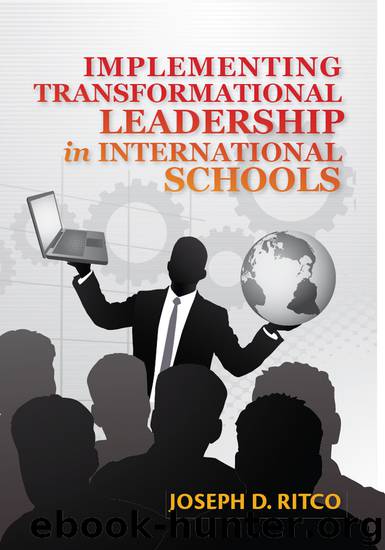Implementing Transformational Leadership in International Schools by Ritco Joseph D

Author:Ritco, Joseph D. [Ritco, Joseph D.]
Language: eng
Format: epub
Publisher: CreateSpace Independent Publishing Platform
Published: 2013-09-13T16:00:00+00:00
How to Be a Proficient Coach or Mentor
Leaders, coaches, and mentors have to be fully and constantly aware that change is often a frightening prospect for many people (Smith 2008), especially if it is hurried in an uncontrolled manner (Ornstein and Hunkins 2009; et al.). And yet this is precisely what they are asking teachers to do—begin a process of intense professional change through coaching, mentoring, and PGPs, albeit in a controlled environment.
Coaches and mentors openly recognize this fear and acknowledge it with their protégés. But they do much more than this to concretely alleviate trepidation in their protégés. Coaches and mentors empower protégés with complete control (ownership) over what and how much change protégés want to attempt and at what intervals it takes place. Proficient coaches and mentors know the best changes occur in small steps that enhance a protégé’s self-confidence and belief in himself or herself, and they deftly guide the protégé in this direction (Isaacson 2007).
Bacharach (2010a, module 8) offers three very clear and easy guidelines for developing effective coaching and mentoring abilities. This writer has tailored and abbreviated them so as to provide a concise framework that can be further modified depending on the international school administrator and the personalities of the coaches and mentors she or he has selected for training. They in turn must adapt them with those they coach or mentor, taking into account important cultural differences, and so on.
Listening
The best coaches and mentors authentically listen to what their protégés are communicating to them verbally and through body language. In fact, Bennis and Nanus (2003) are convinced that the type of innovative learning they associate with the most capable leaders is anchored in astute listening abilities.
Coaches and mentors must realize they are also being scrutinized for what they are expressing audibly or through their own body language. A lack of interest or sincerity communicated by the coach or mentor is quickly picked up by their protégé, and the elemental ingredient of trust is lost. Therefore, the coach or mentor should try at all times to “lean forward toward the speaker, maintain eye contact, and observe facial expressions and body language” (Bacharach 2010a, module 8). If his or her protégé is earnestly engaged, the protégé will reciprocate.
Protégés should do the majority of the talking while their coach or mentor listens with genuine curiosity and without passing judgment. Coaches and mentors need to know when to remain silent and when to interject. Equally pertinent, coaches and mentors should show that they have really heard what was communicated to them by paraphrasing or summarizing what their protégés express and repeating it back to them. If authentic trust has been established, a protégé will feel comfortable correcting whatever discrepancies exist between what he or she originally stated and what the coach or mentor reflected back to him or her.
Furthermore, in order to sow the seeds of trust, a degree of intimacy is required.
With respectful deference to Bacharach (2010a) and Carnegie (2009), advances in
asynchronous and synchronous communications have
Download
This site does not store any files on its server. We only index and link to content provided by other sites. Please contact the content providers to delete copyright contents if any and email us, we'll remove relevant links or contents immediately.
| Administration | Assessment |
| Educational Psychology | Experimental Methods |
| History | Language Experience Approach |
| Philosophy & Social Aspects | Reform & Policy |
| Research |
The Art of Coaching Workbook by Elena Aguilar(51158)
Trainspotting by Irvine Welsh(21636)
Twilight of the Idols With the Antichrist and Ecce Homo by Friedrich Nietzsche(18618)
Fangirl by Rainbow Rowell(9228)
Periodization Training for Sports by Tudor Bompa(8250)
Change Your Questions, Change Your Life by Marilee Adams(7753)
This Is How You Lose Her by Junot Diaz(6873)
Asking the Right Questions: A Guide to Critical Thinking by M. Neil Browne & Stuart M. Keeley(5753)
Grit by Angela Duckworth(5601)
Red Sparrow by Jason Matthews(5463)
Paper Towns by Green John(5175)
Room 212 by Kate Stewart(5102)
Ken Follett - World without end by Ken Follett(4720)
Housekeeping by Marilynne Robinson(4434)
The Sports Rules Book by Human Kinetics(4377)
Double Down (Diary of a Wimpy Kid Book 11) by Jeff Kinney(4257)
Papillon (English) by Henri Charrière(4256)
The Motorcycle Diaries by Ernesto Che Guevara(4088)
Exercise Technique Manual for Resistance Training by National Strength & Conditioning Association(4058)
